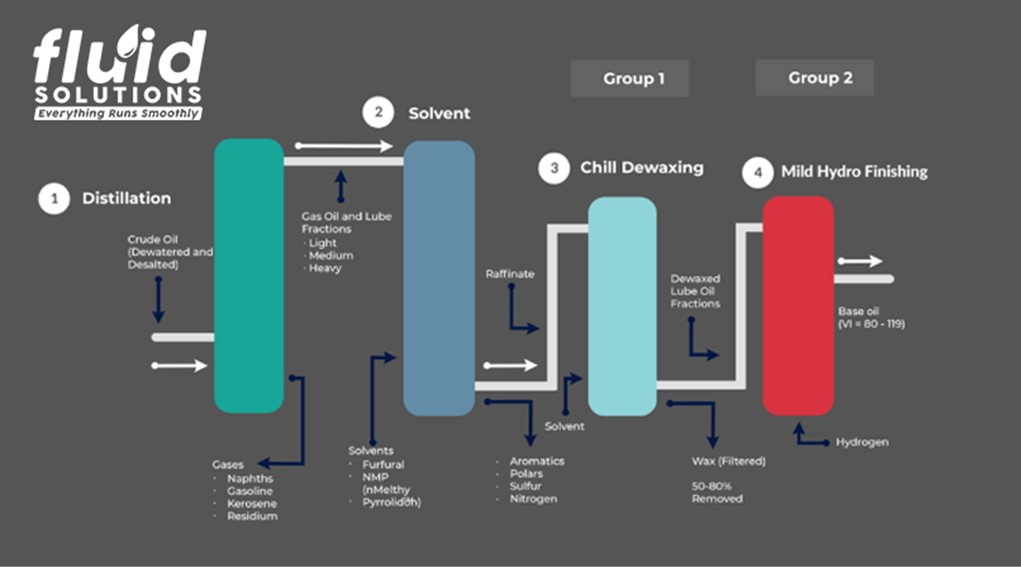
Base oils serve as the foundation for industrial lubricants, with different types influencing their performance and reliability. In this guide, we delve into the distinctions between Group I and Group II base oils, shedding light on their properties, advantages, and applications. ‘
Key Takeaways:
- Base oils form the core of lubricants, essential for reducing friction and heat.
- Group I base oils are traditional, affordable, and common for general lubrication.
- Group II base oils are more refined, offering superior performance, especially for demanding applications like engine and turbine oils, and are becoming more accessible.
- The main difference is in their refining process, which makes Group II purer and higher performing.
- Knowing these base oil distinctions is vital for choosing the right lubricant.
- Fluid Solutions can provide expert guidance for your specific needs.
Introduction to Base Oils
Before delving into the specifics of Group I and Group II base oils, it’s essential to understand their fundamental role in lubricant formulations. Base oils serve as the primary component of lubricants, providing the necessary lubricating properties to reduce friction, wear, and heat generation in machinery and equipment. The quality and characteristics of the base oil significantly influence the overall performance of the lubricant.
Group I Base Oils
Group I base oils are traditional crude or petroleum fractions subjected to solvent refining processes. These oils undergo physical and mechanical treatments to remove impurities like waxes, sulfur, and aromatics.
Advantages of Group I Base Oils
Group I base oils offer several advantages:
- Availability and Affordability: Group I oils are readily available and cost-effective, making them suitable for applications where performance requirements are less stringent.
- Versatility: These oils find widespread use in hydraulic systems, gearboxes, general-purpose lubrication, and other standard applications.
Group II Base Oils
Group II base oils, derived from crude oil, undergo a hydrogen finishing process, which chemically reacts with crude fractions to enhance their properties. This advanced refining method distinguishes Group II oils from their Group I counterparts.
Advantages of Group II Base Oils
Group II base oils offer several advantages over Group I oils:
- Higher Viscosity Indices: With viscosity indices reaching up to 120, Group II oils provide superior lubrication at higher temperatures.
- Lesser Aromatic Content: Their reduced aromatic content (less than 10%) ensures better thermal stability and lower volatility.
- Lower Sulfur Level: Group II oils boast lower sulfur levels, enhancing anti-corrosion and anti-oxidation performance.
Group I vs. Group II Base Oils
Refining Processes and Properties
The primary difference between Group I and Group II base oils lies in their refining processes and resulting properties. While both are derived from crude oil, Group II oils undergo additional processing steps that significantly enhance their purity and performance characteristics.
Performance in Industrial Applications
In industrial settings where machinery operates under varying conditions and temperatures, the superior properties of Group II base oils make them the preferred choice for demanding applications such as engine oils, turbine oils, and other high-performance lubrication needs.
Applications and Transition in Use
For most industrial applications, such as with hydraulic systems and gearboxes, Group I mineral-based oils have found widespread use due to their availability and affordability. In most cases, the properties of Group I base oils, though inferior as against Group II and higher lubricant bases, are sufficient for the regular applications.
In prior years, the use of Group II base oils has been confined to more demanding applications, such as with engine oils, as well steam turbine oils. However, as the pricing of Group II base oils are now nearly aligned with Group I price, it is not surprising anymore to find the use of Group II is gaining popularity.
In summary, lubricants utilizing Group II base oils offer an advantaged alternative nowadays, especially considering its improved characteristics, and relative affordability. Know your base oils for lubricants before making lubricant selection!
Considerations for Lubricant Selection
Understanding the properties and advantages of different base oil types is crucial for informed lubricant selection. Businesses are encouraged to consult with Fluid Solutions for expert guidance in choosing the right lubricants for their specific needs.
Industrial Lubricant Supplier in the Philippines
As the premier supplier of industrial lubrication solutions in the Philippines, Fluid Solutions underscores the importance of understanding these base oil groups for optimal lubricant selection.
Fluid Solutions stands as the foremost provider of industrial lubrication solutions in the Philippines. Contact Fluid Solutions today at (02) 8370 5928 / 0917 894 9156 or via email at inquiry@fluidsolutions.com.ph for expert advice and access to high-quality lubricants tailored to your requirements.


